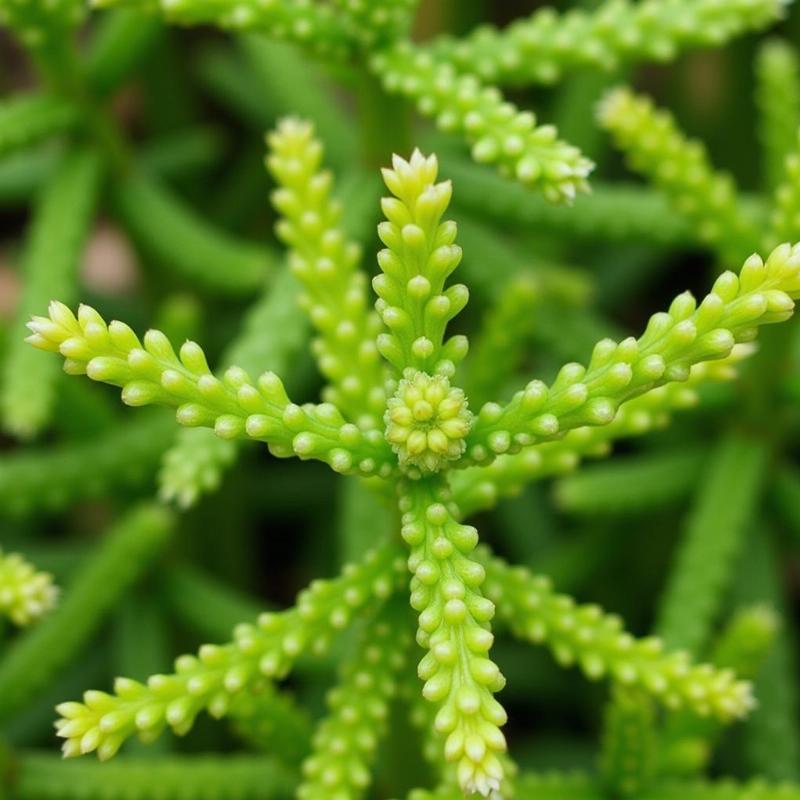String of pearls, that charming succulent with its cascading strands of bead-like leaves, adds a touch of whimsy to any home. But if you’re a dog owner, you’ve probably wondered: is string of pearls toxic to dogs? The answer, unfortunately, is yes. While not deadly, ingesting string of pearls can cause gastrointestinal upset in your canine companion.
Understanding the Toxicity of String of Pearls
String of pearls (Senecio rowleyanus), also known as string of beads or rosary vine, contains saponins. These compounds, while mild, can irritate a dog’s digestive system. The level of toxicity is generally considered mild to moderate, meaning while a nibble might not send your dog to the emergency vet, it’s still important to prevent them from munching on this plant. Symptoms of ingestion can include vomiting, diarrhea, drooling, lethargy, and loss of appetite.
 String of Pearls Plant Close-up
String of Pearls Plant Close-up
If your dog does ingest a significant amount of string of pearls, contact your veterinarian immediately. They can advise you on the best course of action and provide supportive care if needed. Remember, it’s always better to be safe than sorry when it comes to your furry friend’s health.
Keeping Your Dog Safe from String of Pearls
Prevention is key when it comes to plant toxicity and dogs. The best way to protect your dog from string of pearls is to keep the plant completely out of reach. Consider placing it on a high shelf, in a hanging basket, or in a room your dog doesn’t have access to.
If you’re propagating new string of pearls, be extra vigilant. Those little cuttings are even more tempting to a curious dog. Make sure they are kept in a secure location away from your furry friend’s reach.
Training your dog to “leave it” can also be a helpful tool in preventing plant ingestion. This command can be used for a variety of situations, from ignoring dropped food to steering clear of tempting houseplants.
Safe Alternatives for Dog Owners
If you love the look of trailing plants but want to ensure your dog’s safety, there are several non-toxic alternatives to string of pearls. Consider spider plants, Boston ferns, or Swedish ivy. These plants offer a similar aesthetic without posing a risk to your furry friend. Always double-check the ASPCA’s toxic plant list before introducing any new plant to your home.
What to Do if Your Dog Eats String of Pearls?
If you suspect your dog has ingested string of pearls, don’t panic. Observe your dog closely for any signs of gastrointestinal upset, such as vomiting, diarrhea, or lethargy. If your dog displays any symptoms, contact your veterinarian immediately. It’s helpful to know approximately how much of the plant your dog ingested and when the ingestion occurred. Your veterinarian may induce vomiting or recommend supportive care depending on the severity of the situation.
Conclusion
While string of pearls adds a beautiful touch to any home, its mild toxicity makes it a potential hazard for dogs. By taking preventative measures, such as keeping the plant out of reach and training your dog, you can ensure your furry friend stays safe while still enjoying the beauty of indoor plants. Remember, a safe and happy dog is a beautdog!
FAQ
-
What are the signs of string of pearls poisoning in dogs? Vomiting, diarrhea, drooling, lethargy, and loss of appetite are common signs.
-
Is string of pearls deadly to dogs? No, string of pearls is generally considered mildly to moderately toxic. While it’s unlikely to be fatal, it can cause discomfort.
-
What should I do if my dog eats string of pearls? Contact your veterinarian immediately for advice and potential treatment.
-
Are there any safe alternatives to string of pearls? Yes, spider plants, Boston ferns, and Swedish ivy are just a few examples of pet-safe houseplants.
-
How can I prevent my dog from eating string of pearls? Keep the plant out of reach, train your dog to “leave it,” and consider pet-safe plant alternatives.
-
Where can I find a reliable list of toxic plants for dogs? The ASPCA website offers a comprehensive list of toxic and non-toxic plants.
-
Are all succulents toxic to dogs? No, not all succulents are toxic, but many are. Always research a plant’s toxicity before bringing it into your home.
Beautdogs.us is your premier online resource for all things dog-related in the USA. From breed information and expert grooming advice to product reviews and health tips, we’re your one-stop shop for ensuring your furry friend lives their best life. Whether you’re a seasoned dog owner or just starting your journey with a new pup, Beautdogs.us offers a wealth of trustworthy information and resources. Contact us today for personalized support! Email: [email protected], Phone: +1 501-555-7529. Let us help you make your dog a true beautdog!